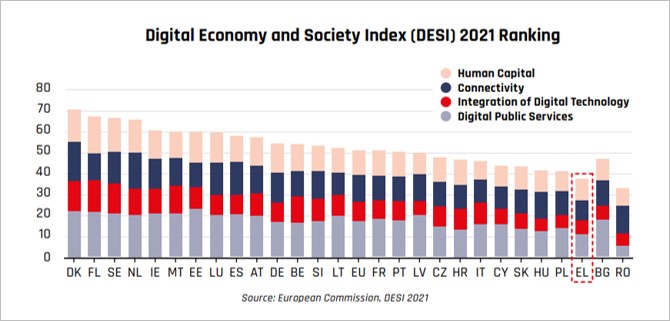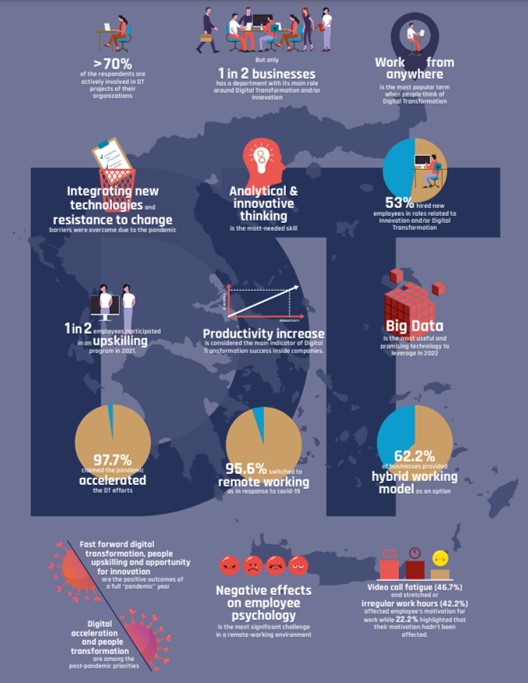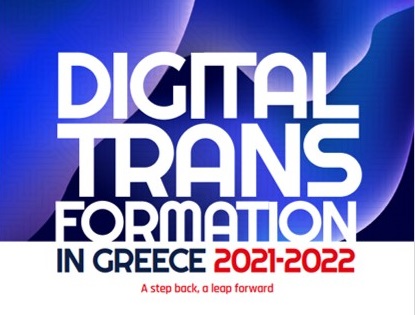Greece has made significant progress in the domain of Digital Technologies in line with the Digital Transformation Bible launched by the Ministry of Digital Governance in 2020. Although accelerated by the pandemic, Digital Transformation in the country has continued at a fast pace.
The technology and innovation enabling platform Found.ation presented the results of a survey that reveals interesting aspects about digital transformation in businesses for the years 2021-2022. The report analyses the main dimensions of digital transformation in Greece, both in the public and private sectors. Implemented with the support of EIT Digital, the survey provides a valuable scope of the Greek corporate ecosystem, examining the degree to which companies and large organisations have adopted Digital Transformation procedures, and pinpointing the reasons for any delays.
The country’s Digital Profile
– According to the Global Innovation Index (GII), concerning the most innovative countries in the world for 2021, Greece ranks 47th among 132 countries. The findings of the Global Innovation Index (GII) concern an assessment conducted by the World Intellectual Property Organization (WIPO).
– One strong point of Greece is the “Human Capital and research” indicator, where Greece is in the 16th place among 132 countries.
– The performance of the country in the indicator “Ease of starting a new business” is excellent as Greece ranked 11th in the world.
– Greece has improved its position also on the Digital Economy and Society Index (DESI) for 2021, compared to the previous year and the EU average. For 2021, the country ranks in the 25th position out of the 27 EU Member States, with Romania ranking last and Bulgaria second to last.
– Greece has an impressive performance in the field of digital skills, having remarkable statistics about women in ICT roles with a percentage that is growing extremely fast (from 20% in 2019 to 27% in 2020) and is well above the EU average (19%), making Greece a frontrunner
– In terms of human capital Greece ranks 21st out of 27 EU countries, remaining below the EU average. The percentage of people with at least basic digital skills is low (51%), while the share of employed professionals in ICT (2.1% in 2019) remains low in 2020 (2%) compared to the EU average (4.3%).

Public services
Public administration modernization and access to e-government services for all are high on the government agenda, with the aim of making digital public services more accessible and useful for citizens and businesses and to simplify and digitize government and public services. The goal for Greece is to be “digital by default” by 2023.
In the digitization of public services, in 2020 Greece scored above the EU average in the number of e-government users, while it far exceeded the EU average in open data readiness, having already implemented relevant legislation and policies.
– According to the open data maturity indicator, Greece has exceeded the EU average of 78%, with a performance of 85%. Moreover, Greece is above the EU average in terms of active users of public services (at 67 % vs. 64%.).
– However, the availability of digital public services for both citizens and businesses remains low (54) compared to an EU average of 75 for citizens and 84 for businesses.
– In 2021, 350 million electronic transactions were made, while more than 1,300 services are now provided digitally through the digital portal gov.gr.
– Several applications are now available through the public administration e-platforms including health services, distance learning, ID cards and driving licenses in the mobile phone, access to the land Registry, digital services related to the management of court cases etc.
The Ministry of Digital Governance also announced a program of digital actions for the municipal units of the country, in order to make the municipalities of Greece “smart”. The program has a total budget of 320 million euros and will be allocated to 16 municipalities in the country with more than 100,000 inhabitants. In addition, an investment of more than 174 million euros concerns smart environmental and cultural infrastructure, including digital action for measuring and monitoring air and marine pollution, smart infrastructure for public buildings and the development of interactive digital services and content.
Connectivity
Greece also improved its scores on connectivity, starting to deploy very high-capacity networks, though it still remains far below the EU average in very high-capacity networks coverage and in fixed broadband take up of speeds of at least 100Mbps. However, the development of future networks is likely to accelerate with the expected investment in fiber optics (such as the Ultra-fast Broadband Project) and the development of the 5G network. Greece scores 99% on the 5G readiness indicator, which means that almost the total 5G pioneer spectrum at EU level has been assigned.

Private Sector
Greece ranks 22nd in the EU on the field of integration of digital technology in business activities. Greek companies are slowly adopting digital technologies, with only 19% using social media compared to the EU average of 23%.
However Digital Transformation has been an integral part in Greek businesses strategy, growing steadily in the last four years. According to a Found.ation’s survey:
– 97.7% of private organizations highlighted that the pandemic accelerated their digital switchover efforts to some extent, with 65% of the answers ranging from “significantly” to “extremely”.
– Also impressive is the fact that Greek companies are among the frontrunners for the use of artificial intelligence (34%), well above the EU average (25%).
– 78% of the businesses taking part in our survey claim that they run projects that include a Digital Transformation scope or are part of a broader DT roadmap, and more than 70% of the respondents are actively involved into these projects.
– 54.17% companies claimed they have created a Digital Transformation and Innovation department.
– 53% of the organizations in our survey hired new employees in roles related to innovation and/or Digital Transformation in 2021, which increased by 11% from 2020.
In the coming years, we expect even more impressive performance, thanks to the Digital Transformation Bible, whose projects are in progress, including strategic measures to make enterprises in Greece even more digital. But as the Found.ation report concludes it is crucial to understand the changes that technology can bring to our lives and our businesses as major shifts are happening in the way we work and learn. We have to consider new realities, create new incentives and develop a different skillset responding to a need for inclusivity, health, wellbeing and collaboration.

* The article is based on the Annual Report “Digital Transformation in Greece 2021/2022” published by Found.ation in collaboration with EIT Digital.
Read also via Greek News Agenda:
The Digital Transformation “bible” of Greece (2020-2025)
Big technology investments to improve Greece’s innovation and digital footprint
Digitalization of the public administration accelerated in Greece due to the coronavirus
2021 a year of new records for the growing Greek Startup scene
IE
TAGS: BUSINESS & TRADE | ECONOMY & DEVELOPMENT | INNOVATION | SCIENCE & TECHNOLOGY













